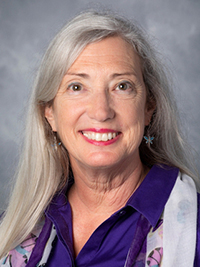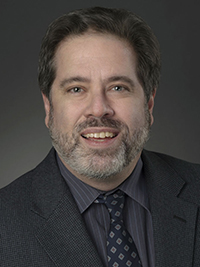Status bestowed upon members demonstrating extraordinary service to ESA
Annapolis, MD; August 30, 2023—In recognition of their long-term dedication and significant contributions to the Entomological Society of America (ESA), two entomologists have been selected as Honorary Members of the Society in 2023.
Honorary Membership acknowledges those who have served ESA for at least 20 years through significant involvement in the affairs of the Society that has reached an extraordinary level. Candidates for this honor are selected by the ESA Governing Board and then voted on by the ESA membership.
This year's honorees will be recognized during Entomology 2023, November 5-8, in National Harbor, Maryland.
ESA's 2023 Honorary Members are:
- S. Kris Braman, University of Georgia
- Robert K.D. Peterson, Montana State University
 S. Kris Braman
S. Kris Braman
University of Georgia
Dr. S. Kris Braman received a B.S. (1978) degree in forest biology with an emphasis in entomology at the SUNY College of Environmental Science and Forestry, Syracuse, and a Ph.D. (1987) degree in entomology at the University of Kentucky. Braman joined Department of Entomology at the University of Georgia as a faculty member in 1989.
Her research focuses on the ecology and management of insect pests of turf and ornamental plants. Her studies blend basic and applied components to improve the sustainability and profitability of urban plant production and landscape pest management. This research emphasizes two areas: 1) identifying and increasing the use of pest-resistant and adapted turf and ornamentals and 2) integrating natural enemies and alternative control technologies into IPM through enhanced understanding of tritrophic interactions in urban plant systems. Most recently her research and teaching focus has centered around conservation of pollinators and other beneficial arthropods. This is reflected in her most recent publications and invited presentations including a TEDx Atlanta talk in May 2023.
Braman has produced, with her students, over 200 publications, including 159 refereed journal articles and 16 book chapters. As director of the Center for Urban Agriculture from 2011 to 2016, she provided leadership in delivery of science-based information to stakeholder groups. The Center mission includes urban county agent program planning and training, professional proficiency certification, online educational programming and support, regional educational programming, and related grant management. Braman is now professor of entomology and department head in the Department of Entomology at the University of Georgia (UGA), in Athens, Georgia. She leads a department of 42 faculty and 65 graduate students located on three campuses.
She has provided extensive direct service to ESA, as well as indirect service by encouraging and sponsoring hundreds of graduate students, postdoctoral scholars, and faculty members in her department to participate in ESA activities at the Section, Branch, and national level, and she has created many opportunities for them to serve ESA at all levels. She served entomology by taking an active role in scientific societies, conferences, workshops, and consultation to the urban agricultural community; mentoring postdocs, graduate, and undergraduate students; and serving on numerous committees.
Braman's participation in and service to ESA began in graduate school. Convinced by her own mentors (Ken Yeargan, Ph.D., and Bobby Pass, Ph.D.) of the importance of involvement and service to ESA, she has made it a career-long commitment. During her last 12 years as an administrator, her main contribution has been to instill that concept to create a culture of involvement and participation in ESA among faculty and students in the Department of Entomology at UGA. She has been a member of ESA since 1983 and has participated in 33 national Annual Meetings and 32 Branch Meetings. She has been a strong proponent of service at the local level in support of ESA Branches, believing that strong Branches are the backbone of our Society. Six of the last 14 Southeastern Branch presidents are UGA faculty or alumni. Her most recent efforts involve nominating faculty for awards and ensuring funding to send graduate and undergraduate students to meetings—for example, sending more than 30 students to the 2022 Joint Annual Meeting in Vancouver. This is becoming increasingly challenging with the cost of travel.
Braman's ESA service includes president of the Southeastern Branch (SEB); SEB Entomology Games judge; chair of the SEB Nominating Committee; member of the SEB Executive Committee (both in the presidential line and as a member-at-large), Program Committee, Resolutions Committee, and Auditing Committee; member of the ESA Nominating Committee, Rules Committee, Youth and Education Committee, and awards judging panels; and symposium organizer, frequent student competition judge, and session moderator and coordinator. Braman has also been an active supporter of her state professional society, the Georgia Entomological Society (GES), where she has served as president, past president, historian, program chair, and Student Affairs Committee chair; as a member of the scholarship selection committee, Executive Committee, and Photo Salon; and as business manager for the society journal, Journal of Entomological Science.
Braman is a recipient of the SEB Distinguished Achievement Award in Horticultural Entomology and the Georgia Green Industry Association Environmental Friend of the Year Award and has been recognized as Distinguished Alum of the Entomology Department at the University of Kentucky. She was chosen for the 2007–2008 LEAD 21 Leadership Program and selected as a 2019 UGA Women's Leadership Fellow. Braman is also a GES Fellow, selected in 2013. She has received society-sponsored outstanding project or publication awards in 2008, 2013, 2018, and 2019 and is a team-member recipient of a Southern IPM Center Center Bright Idea Award.
 Robert K.D. Peterson
Robert K.D. Peterson
Montana State University
Dr. Robert K.D. Peterson has served the Entomological Society of America (ESA) and its membership at a consistently high level for almost 40 years. Additionally, he has developed a distinguished career in research, teaching, and administration over this period.
Peterson received his B.S. in entomology from Iowa State University in 1987 and his M.S. and Ph.D. in entomology from the University of Nebraska in 1991 and 1995. He is currently professor of entomology and department head at Montana State University (MSU). As department head, he leads the Department of Land Resources & Environmental Sciences. As professor, he leads the research and teaching program in Agricultural and Biological Risk Assessment. Specifically, his programs are centered on comparative risk assessment and include focused research on pesticide, biotechnology, and invasive species risk. His work has had a significant and lasting impact on helping to define regulatory approaches and effective strategies for practical pest management implementation (including area-wide approaches). Additional areas of research emphasis include insect ecology, plant-stress ecophysiology, and integrated pest management.
He has published 131 peer-reviewed journal articles, 15 book chapters, and two books on these and other entomological topics where he is considered an international expert. He has taught undergraduate and graduate courses, including environmental risk assessment, insect ecology, and various special-topics graduate courses. He also founded the Professional M.S. program in environmental sciences at MSU in 2011 and directed it until 2022. He has been at MSU since 2002 building a tremendous body of work and receiving numerous awards from peers, including a Distinguished Faculty award from MSU and the Award of Excellence in Integrated Pest Management from the ESA. From 1995 to 2001, he was a scientist and regulatory specialist with Dow AgroSciences where he pioneered the application of biological risk assessment to the discovery and development of crop protection technologies.
Peterson has been an ESA member since he was a sophomore at Iowa State University in 1985. He has held numerous volunteer leadership positions in ESA since 1992. These include, in part, student representative of Section F in 1994, member of the North Central Branch and Pacific Branch Annual Meeting Program Committees, chair of the NCB Public Information and Public Relations Committee in 1998, member of the Founders' Memorial Lecture Committee from 2003 to 2005, and moderator of the ESA Webinar on Cultural Competence and Inclusion in 2022. In addition, he has served as co-moderator, co-organizer, and presenter of numerous symposia since 1992. From 2006 to 2008, Peterson was a member of the Annual Meeting Program Committee, culminating in serving as chair in 2007, which marked a new era for innovative programing for the Annual Meeting as ESA transitioned to a four-Section model. He was a member of the Committee on the Insect Calendar from 2008 to 2015 and its chair from 2009 to 2014. He has been a contributing editor for American Entomologist since 2001.
From 2010 to 2012, Bob was a member of the Governing Board, representing the P-IE Section. From 2011 to 2012, he was a member of the Executive Committee of the Governing Board. From 2012 to 2013, he was chair of the ESA Presidential Committee on Science Policy, which produced the initial policy agenda that remains the foundation for ESA's science policy influence. His work with Science Policy created a sustained capability for ESA that has increased the stature and relevancy of entomology and its members with policy makers. From 2016 to 2019, he was on the Governing Board and in the ESA presidential line. In 2019, Peterson served as president of ESA and created initiatives on advocacy and innovation, including the "Antlion Pit" competition to stimulate member problem solving and engagement. In 2020, as immediate past president, he served as chair of the ESA Science Policy Committee. He currently serves as advisory board member to the International Congress of Entomology.
Outside of ESA—but within entomology, risk assessment, and integrated pest management—he has served on numerous grant panels, editorial roles, and journal peer reviews. Always using ESA as a preferred venue and outlet for his research and professional engagement, Peterson has multiplied his own efforts many times through his students, colleagues, and associations, making the Society a stronger and more effective association for everyone through his service.
###
CONTACT: Joe Rominiecki, jrominiecki@entsoc.org, 301-731-4535 x3009
ABOUT: ESA is the largest organization in the world serving the professional and scientific needs of entomologists and people in related disciplines. Founded in 1889, ESA today has more than 7,000 members affiliated with educational institutions, health agencies, private industry, and government. Headquartered in Annapolis, Maryland, the Society stands ready as a non-partisan scientific and educational resource for all insect-related topics. For more information, visit www.entsoc.org.
